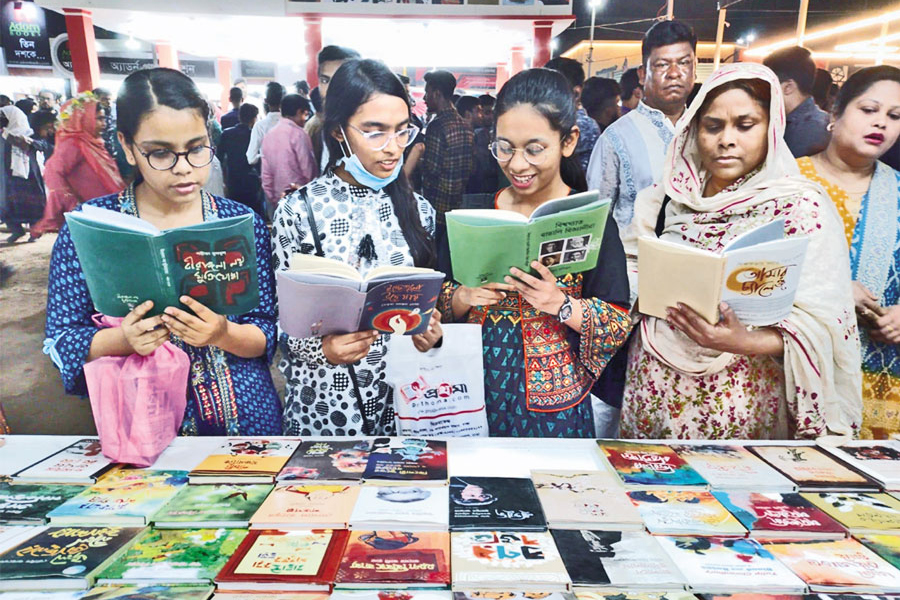
Published :
Updated :

SABIHA, a fresher on the campus and an avid reader of Bangla novels and poetry, went to Amar Ekushey Book Fair with two thousand taka in her purse. With the first thousand, she bought works of writers from West Bengal. Now, with another thousand left, she decided to buy some books by Bangladeshi writers. She read some good reviews on some of their recent works on Facebook. However, there was still more to explore in the West Bengal category. After not thinking much, she split her last thousand between two books; one Bangladeshi and one Indian Bangla.
Often, we see our writers raising their voices against the overwhelming presence and sales of books from Kolkata at the Amar Ekushey Book Fair. Without attempting to measure the magnitude of such domination (and for that matter, accurate data is not available), we can say that the works of West Bengal Writers have a significant place -when it comes to literary works- both in readers' minds and on shelves at bookstalls. According to Section 7.1 of Amar Ekushey Boimela 2023 Policy and Guidelines, publishers can publish books originated, edited, or translated only by a Bangladeshi writer. Moreover, those books have to be printed and published in Bangladesh. However, such instructions have not been observed in Amar Ekushey Book Fairs. Most Bangladeshi writers, aware of this policy, demand that the policy and the guidelines are strictly followed. The market, in this case, outsmarts policy, institutions, and the pressure from concerned stakeholders. Note that there is no ban on the import of overseas books.
A book is a product and thus has a market. The demand for a product depends on the customer's taste and their perception of the quality of the product by different criteria. Now, let's consider textbooks first. A textbook for the undergrad level results from years of intellectual, institutional, and financial efforts. This is why, in many cases, developing and underdeveloped countries need to import textbooks from the developed world. On the contrary, economic resources play comparatively smaller roles in producing literary works. A piece that results from quality thinking, a good understanding of the reader's mind, and market dynamics is more likely to be successful in the market. Marketing activities ranging from market research and promoting the book require economic input. Therefore, variations in success among literary texts can be attributed to the gap between the expectations of the market and the effort to meet them, which can again be attributed to the quality of the work and marketing efforts.
Bangladeshi writers -- as it appears -- need to do better in catering to the desire of the readers. But, in reality, they are not solely responsible for this gap. Here, publishers enter the scene. Most publishers need to be more professional as they are reluctant to invest and lack knowledge and skills in marketing. Some publishers don't even see publishing as a noble business -- they publish any work of anyone for money. This practice, however, is found the world over. If a person wants a publisher for a piece of 'whatever quality' in Kolkata or anywhere else in the world and is willing to pay for it, he/she will find someone to shake hands with. There is a common allegation against many Bangladeshi publishers that they should have paid more attention to the works of promising Bangladeshi writers. They don't because reproducing all-time classics and selling pirated copies is easy. Those publishers need more ambition to reach newer heights along with brilliant up-and-coming Bangladeshi writers.
Humayun Ahmed was possibly the only Bangladeshi writer since the '90s to build such loyalty among many readers on both sides of the border. He was the mastermind behind the marketing of his books himself, as he knew the pulse of the middle class of Bangladeshi society and got Anyaprakash ( a publishing house) by his side. Unfortunately, few are polymaths like him; many promising writers need promotional and advisory support from skilled and honest publishers. As Bangladeshi thrillers and OTT content are setting an example by taking over a big chunk of the market of West Bengal, publishing houses should follow; at least a few should hunt and promote promising writers. Bangladeshi publishers and writers should strive to command the respect of the combined market of Bangladesh and West Bengal.
Sabiha is a customer in the book market where selling books is more or less business for writers and publishers; the better the marketing effort to influence her perception and choice, the greater the share of her votes.
The writer is a member of the Bangladesh Civil Service and a passionate reader. gazi.noyon@yahoo.com


 For all latest news, follow The Financial Express Google News channel.
For all latest news, follow The Financial Express Google News channel.